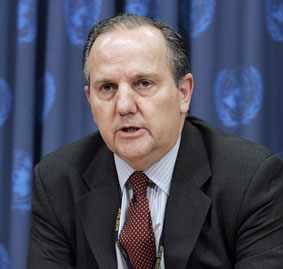Bradley Manning case sparks UN criticism of US government

Juan Mendez, UN Special Rapporteur on Torture, has reprimanded US for secrecy around the treatment of Bradley Mannin
UN torture representative suggests White House stalling his private meeting with American soldier
By Ewen MacAskill, The Guardian
April 11th, 2011 | A senior United Nations representative on torture, Juan Mendez, issued a rare reprimand to the US government on Monday for failing to allow him to meet in private Bradley Manning, the American soldier held in a military prison accused of being the WikiLeaks source. It is the kind of censure that the UN normally reserves for authoritarian regimes around the world. Mendez, the UN special rapporteur on torture, said: “I am deeply disappointed and frustrated by the prevarication of the US government with regard to my attempts to visit Mr Manning.”
Manning’s supporters claim that the US is being vindictive in its treatment of Manning, who is held at the Marine base at Quantico, Virginia, in conditions they describe as inhumane.
Mendez, who has been investigating complaints about his treatment since before Christmas, said the US department of defence would not allow him to make an “official” visit, only a “private” one. An “official” visit would mean he meets Manning without a guard present. A “private” visit means with a guard and anything the prisoner says could be used in the planned court-martial.
Mendez pointed out that his mandate was to conduct unmonitored visits, and that had been the practice in at least 18 countries over the last six years.
“Since December 2010, I have been engaging the US government on visiting Mr Manning, at the invitation of his counsel, to determine his condition,” Mendez said. “Unfortunately, the US government has not been receptive to a confidential meeting with Mr Manning.”
He added: “I have since last year on several occasions raised serious concern about the conditions of detention of Mr Manning, who since his arrest in May 2010, has been confined to his cell for 23 hours a day at the Marine Corps Brig, Quantico, Virginia. I have also urged the authorities to ensure his physical and mental integrity.”
He had been due to issue his statement on Friday but delayed it until after a meeting the same day with representatives of the US defence and state departments to ask them to reconsider their decision to deny him unfettered access. The officials confirmed that Manning could ask to see Mendez if he wished and, in that case, the US government would have no objection to a “private visit”, Mendez said.Mendez, an Argentinian, took over the job last year for a six-year term. Before that, he worked for the UN as a specialist in genocide.
He said: “My request for a private, confidential and unsupervised interview with Manning is not onerous: for my part, a monitored conversation would not comply with the practices that my mandate applies in every country and detention centre visited.”
Mendez made it clear he expected more from the US. “The United Statesof America has a key role in setting examples on issues concerning my mandate as special rapporteur on torture, which makes it a vital partner for engagement.”
In spite of the government decision, he would still meet Manning if the detainee wished, while continuing to insist on an interview without witnesses.
David Coombs, Manning’s lawyer, in a blogpost on his website, said he had been trying to organise visits by Mendez and others, including the Democratic Congressman Dennis Kucinich. “Despite multiple inquires from the defence and the interested parties, the Quantico brig and the government have denied the requests for an ‘official visit’,” he said.
This article was originally published by the Guardian. Read the original here.









